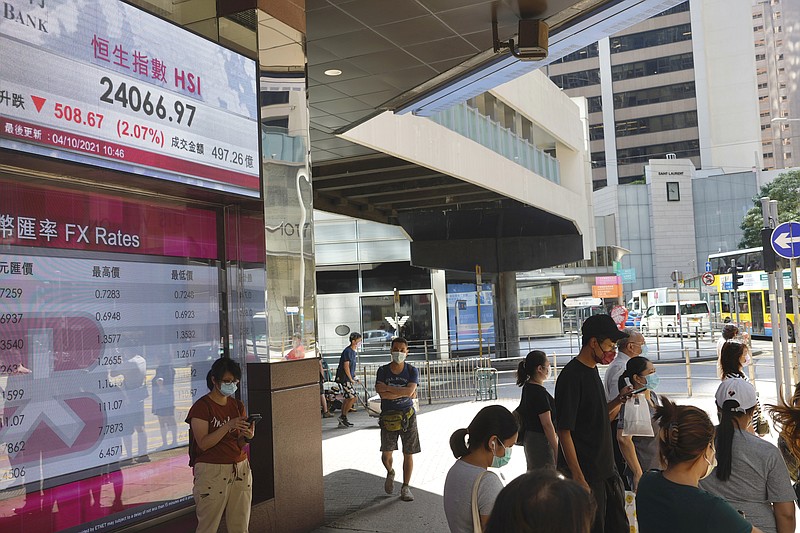Technology companies led a broad slide for stocks on Wall Street Monday, as rising bond yields and energy prices stoked investors' concerns about higher inflation.
The S&P 500 fell 1.3%, the Dow Jones Industrial Average dropped 0.9% and the tech-heavy Nasdaq lost 2.1%.
The price of oil hit a seven-year high as OPEC and allied oil producers stuck with a plan to cautiously raise production even as global demand for crude oil increases.
Treasury yields, which moved sharply higher last week, rose again. The recent jump has contributed to weakness in technology stocks. Apple fell 2.5% and Microsoft dropped 2.1%.
Big communication companies also fell. Facebook slid 4.9% a day after a former employee told "60 Minutes" that the company has consistently chosen its own interests over the public good. The social network, and its Instagram and WhatsApp platforms, also suffered a worldwide system failure that began around midmorning Monday.
"What you're seeing today is those areas -- the expensive, growth technology type of areas -- that had led over the past few months as interest rates remained low are now reversing as you're seeing interest rates move higher," said Megan Horneman, director of portfolio strategy at Verdence Capital Advisors.
The S&P 500 fell 56.58 points to 4,300.46. The decline follows the benchmark index's worst week since winter and a 4.8% pullback for September, the S&P 500′s first monthly loss since January.
The Dow Jones Industrial Average dropped 323.54 points to 34,002.92. The Nasdaq lost 311.21 points to 14,255.48.
Small company stocks also fell. The Russell 2000 index gave up 24.16 points, or 1.1%, to 2,217.47.
U.S. crude oil prices rose 2.3% and topped $77 per barrel for the first time since 2014.
Natural gas prices jumped 2.6%. Energy companies rose along with energy prices. Devon Energy rose 5.3% for the biggest gain in the S&P 500. Marathon Oil climbed 4.1%.
The yield on the 10-year Treasury rose to 1.49% from 1.47% Friday. The yield was at 1.31% on Sept. 20. The swift rise in interest rates has forced a reassessment of whether stocks have grown too expensive, particularly already high-priced technology companies.
Investors are increasingly worried about inflation as oil prices rise and companies continue facing supply problems that increase their costs and force them to raise prices. Wall Street is also worried about the Federal Reserve's timing on trimming back bond purchases and its eventual move to raise its benchmark interest rate.
"You really have a lot of reasons for the tape to trade defensively right now," said Julian Emanuel, chief equity and derivatives strategist at BTIG. "If you're not going to get the bond market rallying and yields declining, then the likelihood is you see more volatility in stocks."
Investors are also preparing for the latest round of corporate earnings, which will ramp up in the next several weeks. They are also still closely monitoring economic data for more signals about the pace of the recovery as businesses and consumers deal with the impact of covid-19 and the highly contagious delta variant.
Wall Street will get more information on the economy's health this week.
The Institute for Supply Management today will release its service sector index for September. The services sector is the largest part of the economy and its health is a key factor for growth.
On Friday, the Labor Department will release its employment report for September. The employment market has been struggling to fully recover from the damage done by covid-19 more than a year ago.


